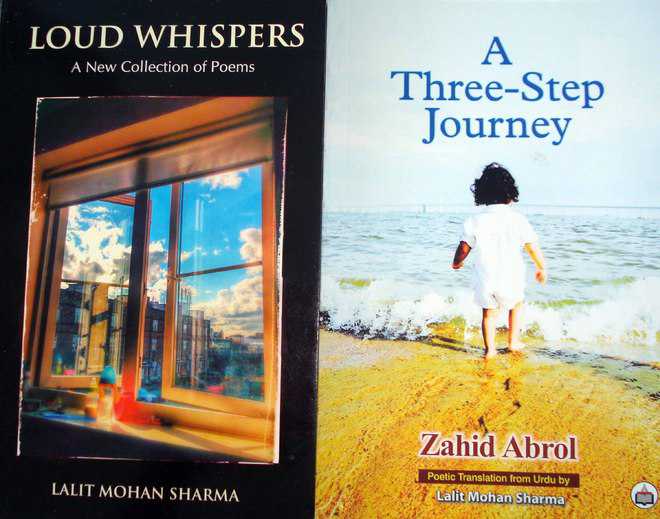Two poetry books from Dharamsala
Shriniwas Joshi
Dr Lalit Mohan Sharma had sent me two poetry books - ‘Loud Whispers’ and ‘A Three-Step Journey’ - long back (see photo). Actually, ‘Loud Whispers’ remained in my shelf for a longer time but it never went out of my mind. It is Books Plus, New Delhi publication and costs Rs 300 for a paperback edition containing 37 poems. I find it rather costly when I compare it with that of his earlier book ‘Pearls and Pebbles’ though the time difference in publication of the two books is six years. Lalit writes in Preface which he names as ‘A Later-Day Word’, “Emotions happen. Keep happening.” Lalit is right because poetry is when an emotion has found its thought and the thought has found words.
Many may not know that Kala Amb in Sirmaur is called so because the Rajas of Sirmaur used to hang those who were disloyal to the state and the traitors on the branches of the mango trees there. The trees used to bring ‘kaal’ (death) to them, so Kala Amb. Lalit discloses this fact in the poem ‘Independence Day Oath’: “That was not complicated/ They also hanged men/ In secret and by mango trees/ A town came to be called Kala Amb.” Does he like feet touching by the younger lots? He resists and gives them a light hug after ‘raising them upright’ but “At times it does find me/ Secretly pleased/ With the aura arousing/ Exhibitions of such acts”, says he in ‘Reverence’.
He uses charming words to advise the people about not living in yesterdays in ‘A Late-Night Dreams’: “Night falls as the sun sets/ A day is forever lost/ Beyond human reach/ Forever it becomes one/ With blood marrow bones/ A part of you yet ever apart/ If need be jump outside it/ Abandon the house you lived in.” Spanish are fond of dancing amidst rain drops and call it ‘la danza de la lluvia’ but Lalit hears the chat among the rain drops and says: “One rain-drop said to another/ let us run away/ they keep running/ that’s how rain is in full bloom.”
There are different kinds of loud music. The poet gives six different types but the one I also feel and wish it to be curtailed somehow is reflected in the poem ‘Loud Music’: “Very often (as at a wedding)/ The music is loud/ One has to shout/ In order to get heard/ A tentative nod is all the attention/ Your argument will most likely get.” Going through the book, I wondered how a poet from the district of Kangra could not write on Dhauladhar, the mountain range that has evoked many to hold pen in their hands to write on its brilliance, till I read ‘On Sixtieth Birthday’. The poet says: “As a guardian stood/ The sacred mountain range/ Dhauladhar/ With its glaciers and craggy ridges/ Ravines and rugged pathways/ Precious playfields of unravished nature.”
I had asked this question when reviewing Lalit’s earlier book. Does it not happen that time spend with someone close to your heart, stays with you forever? Yes, it does. In ‘Enthralled’, he betters and refines his emotions in flowing words, “Enthralled by the looks her glance/ I listen to the rain/ Long after it has ceased/ Flowing loud/ In rivulets running downhill.”
‘A Three-Step Journey’ is poetic translation in English by Lalit Mohan Sharma (see photo) from Urdu written by Zahid Abrol. It is published by Authorspress, New Delhi and is in paperback, has translation of Zahid’s 54 poems and ghazals costing Rs 295. Zahid writes, “Yeh to dilfigaar baaten thin, jin ko sun kar main ro padaa, varnaa/ sab ke aansoo sametane waalaa, apne aansoo chupaa bhi saktaa hai.”
Lalit translates, “Tears only streamed at the tales/ That were heart-tearing, otherwise/ For he, who carried within the woes of all/ Could always hide his own.” Whenever a translation is done, certain idiosyncrasies and discrepancies occur because of syntactic divergence, lexicalization differences and divergences in connotation and denotation differences. Although Lalit has done his best in giving right spice to the translated version, yet the flavour that the original in Urdu gives is atypical.
— The writer is a retired bureaucrat









